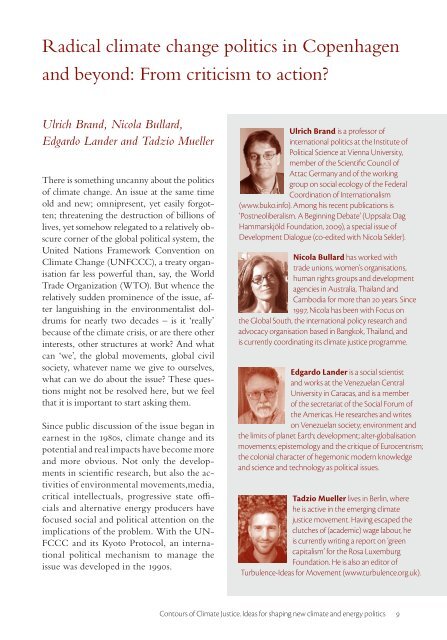Contours of Climate Justice - Dag Hammarskjöld Foundation
Contours of Climate Justice - Dag Hammarskjöld Foundation
Contours of Climate Justice - Dag Hammarskjöld Foundation
You also want an ePaper? Increase the reach of your titles
YUMPU automatically turns print PDFs into web optimized ePapers that Google loves.
Radical climate change politics in Copenhagen<br />
and beyond: From criticism to action?<br />
Ulrich Brand, Nicola Bullard,<br />
Edgardo Lander and Tadzio Mueller<br />
There is something uncanny about the politics<br />
<strong>of</strong> climate change. An issue at the same time<br />
old and new; omnipresent, yet easily forgotten;<br />
threatening the destruction <strong>of</strong> billions <strong>of</strong><br />
lives, yet somehow relegated to a relatively obscure<br />
corner <strong>of</strong> the global political system, the<br />
United Nations Framework Convention on<br />
<strong>Climate</strong> Change (UNFCCC), a treaty organisation<br />
far less powerful than, say, the World<br />
Trade Organization (WTO). But whence the<br />
relatively sudden prominence <strong>of</strong> the issue, after<br />
languishing in the environmentalist doldrums<br />
for nearly two decades – is it ‘really’<br />
because <strong>of</strong> the climate crisis, or are there other<br />
interests, other structures at work? And what<br />
can ‘we’, the global movements, global civil<br />
society, whatever name we give to ourselves,<br />
what can we do about the issue? These questions<br />
might not be resolved here, but we feel<br />
that it is important to start asking them.<br />
Since public discussion <strong>of</strong> the issue began in<br />
earnest in the 1980s, climate change and its<br />
potential and real impacts have become more<br />
and more obvious. Not only the developments<br />
in scientifi c research, but also the activities<br />
<strong>of</strong> environmental movements,media,<br />
critical intellectuals, progressive state <strong>of</strong>fi -<br />
cials and alternative energy producers have<br />
focused social and political attention on the<br />
implications <strong>of</strong> the problem. With the UN-<br />
FCCC and its Kyoto Protocol, an international<br />
political mechanism to manage the<br />
issue was developed in the 1990s.<br />
Ulrich Brand is a pr<strong>of</strong>essor <strong>of</strong><br />
international politics at the Institute <strong>of</strong><br />
Political Science at Vienna University,<br />
member <strong>of</strong> the Scientifi c Council <strong>of</strong><br />
Attac Germany and <strong>of</strong> the working<br />
group on social ecology <strong>of</strong> the Federal<br />
Coordination <strong>of</strong> Internationalism<br />
(www.buko.info). Among his recent publications is<br />
‘Postneoliberalism. A Beginning Debate’ (Uppsala: <strong>Dag</strong><br />
<strong>Hammarskjöld</strong> <strong>Foundation</strong>, 2009), a special issue <strong>of</strong><br />
Development Dialogue (co-edited with Nicola Sekler).<br />
Nicola Bullard has worked with<br />
trade unions, women’s organisations,<br />
human rights groups and development<br />
agencies in Australia, Th ailand and<br />
Cambodia for more than 20 years. Since<br />
1997, Nicola has been with Focus on<br />
the Global South, the international policy research and<br />
advocacy organisation based in Bangkok, Th ailand, and<br />
is currently coordinating its climate justice programme.<br />
Edgardo Lander is a social scientist<br />
and works at the Venezuelan Central<br />
University in Caracas, and is a member<br />
<strong>of</strong> the secretariat <strong>of</strong> the Social Forum <strong>of</strong><br />
the Americas. He researches and writes<br />
on Venezuelan society; environment and<br />
the limits <strong>of</strong> planet Earth; development; alter-globalisation<br />
movements; epistemology and the critique <strong>of</strong> Eurocentrism;<br />
the colonial character <strong>of</strong> hegemonic modern knowledge<br />
and science and technology as political issues.<br />
Tadzio Mueller lives in Berlin, where<br />
he is active in the emerging climate<br />
justice movement. Having escaped the<br />
clutches <strong>of</strong> (academic) wage labour, he<br />
is currently writing a report on ‘green<br />
capitalism’ for the Rosa Luxemburg<br />
<strong>Foundation</strong>. He is also an editor <strong>of</strong><br />
Turbulence-Ideas for Movement (www.turbulence.org.uk).<br />
<strong>Contours</strong> <strong>of</strong> <strong>Climate</strong> <strong>Justice</strong>. Ideas for shaping new climate and energy politics 9
















